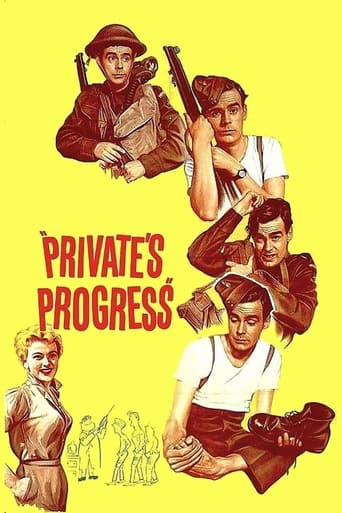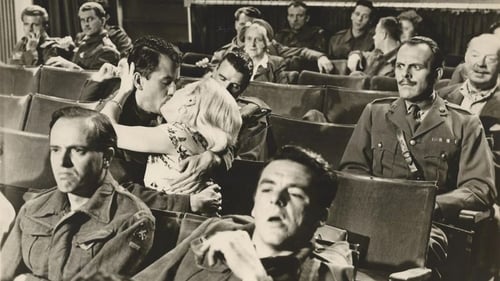robert-temple-1
This film is a joy to watch, because of the perfect timing and comic talents of Ian Carmichael, who really was the fifties equivalent in Britain of Woody Allen. Carmichael plays a hopelessly incompetent but perfectly charming draftee to the Army during World War II. He starts out as an officer because he has a posh accent, but is quickly demoted to a private because he is so hopeless. But even as a private he cannot cope. Richard Attenborough plays Carmichael's chum. Terry-Thomas plays his usual pastiche role of an upper class twit officer with a sneer. There is nothing particularly inventive about this film, it is just jolly good fun. It was directed by John Boulting and produced by Roy Boulting. It's those brothers again. Ian Bannen makes his first credited appearance in a feature film. Dennis Price and Thorley Walters play officers. William Hartnell, always the sergeant major is, well, the sergeant major, and there was never anybody better at that than he was. Hartnell is one of those amazing stalwarts of British films who deserves more attention than he has received. He was not a Cockney, he was one of the locals whom I know so well, the older ones of whom proudly say of themselves: 'I'm from West Central' (WC1 postal area), better known as Holborn.
l_rawjalaurence
PRIVATE'S PROGRESS, the first of the Boulting Brothers' series of satirical films - produced by themselves in association with British Lion - is a bit of a structural ragbag, with a comic look at army training followed by a dangerous (yet successful) mission to steal German art treasures.Stanley Windrush (Ian Carmichael) is an upper-class twit studying at Oxbridge who is plucked from his safe life as undergraduate to serve as an officer in World War II. He proves totally incompetent in his army training, despite the best efforts of Sgt. Sutton (William Hartnell) to train him. He encounters a variety of colorful characters, notably Private Cox (Richard Attenborough) as well as Commanding Officer Hitchcock (Terry-Thomas) who is prone to describing his charges as an "absolute shower!" Having left camp without commission, Windrush is co-opted into a secret mission run by his uncle Bertram Tracepurcel (Dennis Price) that involves a trip to Germany. Disguised as a Nazi officer - although he knows no German - Windrush bumbles his way through the scheme, only to discover at length that its purpose was not what he first assumed.PRIVATE'S PROGRESS follows a familiar path trodden by other Fifties service comedies, notably RELUCTANT HEROES (1951) and CARRY ON SERGEANT (1958) - with Hsrtnell appearing once more in the latter film as an exasperated sergeant. The Boulting Brothers seem intent on showing how many of those on active service during World War II were manifestly unsuited to the task; the fact that Britain actually emerged triumphant was almost in spite rather than due to their efforts. At the time the film was made Carmichael was gradually ascending to stardom; having played another bumbler in SIMON AND LAURA (1955), he was to repeat the same role in I'M ALL RIGHT JACK (1959). The Boultings surround him with a gallery of other incompetents, notably Terry-Thomas, Kenneth Griffith, Victor Maddern and Ian Bannen.On the other hand the film makes some serious points about the levels of crime that took place during the war. Con-artists such as Tracepurcel and Cox flourished at that time, taking advantage of their secure jobs in the services to instigate a series of illegal operations. The fact that are both are found out at the end of the film has more to do with the prevailing codes of censorship at that time, rather than their own ineptitude. Spivs made a highly lucrative living during the Forties, and PRIVATE'S PROGRESS shows explicitly why that was the case.
Alice Liddel
The comedies of the Boulting Brothers may not have dated very well. It is hard to believe that 'Private's Progress' was released only three years before 'Some Like It Hot', because while Wilder's films seems fresher and more modern with each passing year, ever renewable and adaptable, big enough to hold the latest theory or fad, 'Progress' is a dinosaur, stone dead, trapped inside a mindset only Anne Widdicombe would recognise, unable to transcend its time or ideology by cinematic invention, comedic originality, or subversive ideas.Furthermore, many Boultings' comedies, such as 'I'm Alright Jack' and 'Carlton-Browne of the FO' are virtually indistinguishable, sticking an upper-class ass into an 'alien' environment, be it of class, profession, modernisation, and watch him make an upper-class ass of himself.
Actually, this is a little unfair on the Boultings - one can see what they're doing. Usually embodied by the sublimely silly Ian Carmichael, this character is a receptacle of a certain kind of English ideal, someone fundamentally decent, loyal, complacent, absent-minded, a good egg, cricket-playing sort of chap, a person so removed from the actuality of real life, that when he is actually thrown into this modern inferno, where his values are so much empty posturing, he is hopelessly out of his depth, a figure of fun, to be used and abused by the new aristocracy, the cads, entrepeneurs, go-getters, women; crooks one and all. But he's not some sort of naive Holy Fool in a world of devils; he is dangerous, and his practical paralysis enables the devils to thrive, as happens in 'Progress', with a plot so blithely horrifying, you have to pay attention to be shocked.Because, even though moments of laugh-out laughter are sparse (there are a few, eg Stanley's drunken scene), this is a thoroughly enjoyable film. This enjoyment comes largely from the Brothers' cynicism, by trotting out out the same old reliable faces you get in every British comedy of the period, aware that the mere sight of them will guarantee a fond chuckle and immediate pleasure. And dammit if they're not right.They're all here - Carmichael, so good-naturedly inept, you can't help warming to him; the godlike Terry-Thomas, less a lecher here than usual as the bored major who slips off to the cinema or pub, although he does listen eagerly to tales of his unit's priapic effect on the local females - his 'you're all absolute showers' will never pall; Dennis Price, another glorious study in polished evil to rank with 'Kind Hearts and Coronets', as ruthlessly efficient as the Nazis as he profits from fleeing Jews (in many ways, this is a much more successful take on the world of 'Catch-22' than Nichols' film); Richard Attenborough, whose greatness as an actor is in inverse proportion to his talents as a director, wonderful here as the sly cockney to watch (as with 'The League of Gentlemen', it's a great shame that British cinema at the time was so censorious); John le Mesurier, who needs only to open up his mouth to suggest barely concealed aghastness (sic?).The film starts well, with the timeless arcadia of Oxbridge contrasted with the destructive horror of the war situation. The Boultings' comedy is pretty much formulaic, a series of character sketches giving on to an implausible, though enjoyable plot. As is advisable in comedies, Boulting shoots in a restrained, unobtrusive style, never flat, sometimes straining for the picturesque, but sometimes, with a sharp camera movement, achieving a superb effect, such as the queue outside the medical tent where Stanley stands, a bit 'fragile'; the white pillars looking frighteningly like the unmarked military graves you find dotting France.





